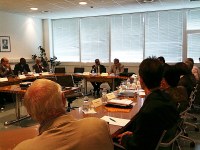 Twenty-four COMSATS representatives from 14 countries, including Brazil, China, Colombia, Egypt, Ghana, Iran, Sudan and Nigeria, will be present to discuss activities conducted by both COMSATS member institutions and other centres of scientific excellence in the developing world over the past year.
Twenty-four COMSATS representatives from 14 countries, including Brazil, China, Colombia, Egypt, Ghana, Iran, Sudan and Nigeria, will be present to discuss activities conducted by both COMSATS member institutions and other centres of scientific excellence in the developing world over the past year.
COMSATS and its centres of excellence," says TWAS executive director Mohamed Hassan, "have done a great deal of work in promoting science-based sustainable development."
Since its inception, COMSATS has focused not only on environmental issues, but also on developing new materials and devising appropriate technologies. For instance, COMSATS-affiliated institutions in Brazil, China, Iran, Egypt and Jamaica have implemented environmental protection and management programmes, contributed to the study of the climate and atmospheric physics, and laid the groundwork for more effective responses to the risks posed by extreme climate events.
"Collaborative efforts," Hassan notes, "have not only involved centres in COMSATS member countries, but have also included centres in countries that, for now, do not belong to COMSATS. These centres can nevertheless benefit from the Commission's experience."
For example, Pakistan, which is not only a COMSATS member but also its host country, has initiated a telemedicine and 'eHealth' programme to disseminate good public health practices via the Internet. Meanwhile, Bolivia, which is not a COMSATS member, has created a nature reserve, the 'Beni Biological Station', to protect the biosphere. It is one of only four places worldwide where the endangered White-winged Nightjar (Caprimulgus candicans) nests. Both of these activities will be discussed at the conference.
As Imtinan Qureshi, executive director of COMSATS, explains, "collaborations between centres of scientific excellence in different countries are becoming more essential, as both rich and poor countries increasingly examine the most effective ways to invest their resources and reach out to science as a primary tool for development."
Presentations at the meeting will concentrate on the following thematic areas: information and communication technologies, agricultural biotechnologies, natural products, climate change, materials science, building materials and mathematical modelling.
"The goal of the meeting and, more generally, COMSATS," says Qureshi, "is for institutions of scientific excellence to exchange ideas and experiences, and to learn from one another. It's a goal that we share with TWAS, and we are delighted that this year's meeting provides us with such a valuable opportunity to work together."
For additional information, visit http://www.comsats.org/index.php?link=13th_CC_2010

